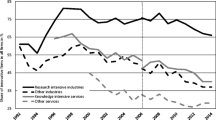Abstract
In this chapter, we discuss the limitations of traditional approaches in economics for resolving several issues arising in a globalized society. Although the concept of efficiency has been the core principle when analyzing economic phenomena in modern economics, it has been apparent that the concept of fairness and justice are far more important concerns for most of the people in the global society. Fairness and justice will be the major focus of scientific research in various fields such as philosophy, psychology, moral science, neuroscience, sociology, and so on. In this sense, the direction of economics will be centered around issues of humanity and spirituality.
Access this chapter
Tax calculation will be finalised at checkout
Purchases are for personal use only
Similar content being viewed by others
Notes
- 1.
See https://www.oxfam.org/en/pressroom/…/just-8-men-own-same-wealth-half-world (date: Febraury 27, 2017).
- 2.
- 3.
In Buddhist teachings, supreme truth can be reached by forgetting the self.
- 4.
The origin is not clear, but it is believed to be the words of Buddha.
- 5.
References
Ainslie, D. C., & Butler, Annemarie (Eds.). (2015). The Cambridge Companion to Hume’s Treatise. New York: Cambridge University Press.
Ariely, D. (2008). Predictably irrational: The hidden forces that shape our decisions. London: HarperCollins.
Ariely, D. (2010). The upside of irrationality: The unexpected benefits of defying logic at work and at home. London: HarperCollins Publishers.
Allingham, M. G., & Sandmo, A. (1972). Income tax evasion: A theoretical analysis. Journal of Public Economics, 1, 323–338.
Atkinson, A. B. (2015). Inequality. Cambridge, MA: Harvard University Press.
Berger, P. (2011). Invitation to sociology: A humanistic perspective. New York, NY: Open Road Media.
Breen, John, and Mark Teeuwen. (2013). Shinto in history: Ways of the kami. Routledge.
Connell, R. (2013). Why do market ‘reforms’ persistently increase inequality? Discourse: Studies in the Cultural Politics of Education, 34, 279–285.
Cosmides, L., & Tooby, J. (2013). Evolutionary psychology: New perspectives on cognition and motivation. Psychology, 64, 201–229.
Delanty, G., & He, B. (2008). Comparative perspectives on cosmopolitanism: Assessing European and Asia perspectives. International Sociology, 23, 323–344.
Dirkx, J. M. (2001). The power of feelings: Emotion, imagination, and the construction of meaning in adult learning. New Directions for Adult and Continuing Education, 89, 63–72.
Epple, D., & Romano, R. (1998). Competition between private and public schools, vouchers, and peer-group effects. American Economic Review, 88, 33–62.
Frey, B. S., & Stutzer, A. (2010). Happiness and economics: How the economy and institutions affect human well-being. Princeton, NJ: Princeton University Press.
Garland, E. L., Farb, N. A., Goldin, P. R., & Fredrickson, B. L. (2015). The mindfulness-to-meaning theory: Extensions, applications, and challenges at the attention–appraisal–emotion interface. Psychological Inquiry, 26, 377–387.
Haidt, J. (2012). The righteous mind: Why good people are divided by politics and religion. New York: Vintage.
Hill, S. C. (1978). Contrary meanings of science—Interaction between cultural and personal meanings of research in a developing country research institution. In S. S. Blume (Ed.), Current perspectives in the sociology of science. London: Wiley.
Kikuchi, N. (2013). Judaism, Christianity, and Islam—The linkage of Monotheism. Tokyo: Chikuma-shobo. Japanese.
Kohlberg, L. (1969). Stage and sequence: The cognitive-developmental approach to socialization. Chicago, IL: Rand McNally.
Kuroda, T., Dobbins, J. C., & Gay, S. (1981). Shinto in the history of Japanese Religion. Journal of Japanese Studies, 7(1), 1–21.
Pink, D. (2006). A whole new mind: Why right-brainers will rule the future. New York: Riverhead Books.
Schumacher, E. F. (1992). Small is beautiful: A study of economics as if people mattered. London: Vintage Books.
Schumacher, E. F. (1993). Buddhist economics. In H. Daly & K. Townsend (Eds.), Valuing the earth: Economics, ecology, ethics. Cambridge, MA: The MIT Press.
Sedlacek, T. (2012). Economics of good and evil: The quest for economic meaning from Gilgamesh to wall street. London: Oxford University Press.
Stone, J. I. (2003). Original enlightenment and the transformation of medieval Japanese Buddhism. No. 12. University of Hawaii Press, 2003.
Suzuki, D. (2013). Eight lectures on Zen. Tokyo: Kadokawa Sensho. Japanese.
Takeda, H., & Boyns, T. (2014). Management, accounting and philosophy: The development of management accounting at Kyocera, 1959–2013. Accounting, Auditing & Accountability Journal, 27(2), 317–356.
Yagi, T. (2016). Happiness and employment status. In K. Urakawa, K. Yonezaki, & T. Tachibankai (Eds.), Advances in happiness research: A comparative perspective. Tokyo: Springer.
Vitali, S., Glattfelder, J. B., & Battiston, S. (2011). The network of global corporate control. PLoS ONE, 6(10), e25995.
Woodhull, S. (2016). The convergence divergence dichotomy—Eastern and Western philosophy—Can the Twain Ever Meet? http://ssrn.com/abstract=2780887. Accessed May 25, 2016.
Author information
Authors and Affiliations
Corresponding author
Editor information
Editors and Affiliations
Rights and permissions
Copyright information
© 2018 The Editor(s)
About this chapter
Cite this chapter
Yagi, T. (2018). Dimensions of Change Within the Economics Mainstream. In: Yamash’ta, S., Yagi, T., Hill, S. (eds) The Kyoto Manifesto for Global Economics. Creative Economy. Springer, Singapore. https://doi.org/10.1007/978-981-10-6478-4_4
Download citation
DOI: https://doi.org/10.1007/978-981-10-6478-4_4
Published:
Publisher Name: Springer, Singapore
Print ISBN: 978-981-10-6477-7
Online ISBN: 978-981-10-6478-4
eBook Packages: Economics and FinanceEconomics and Finance (R0)




